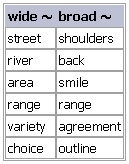|
Từ điển Oxford Advanced Learner 8th
 wide
wide

wide [wide wider widest] adjective, adverb, noun BrE [waɪd] NAmE [waɪd]
adjective (wider, wid·est)
FROM ONE SIDE TO THE OTHER
1. measuring a lot from one side to the other
•a wide river
• Sam has a wide mouth.
•a jacket with wide lapels
• Her face broke into a wide grin.
Opp: ↑narrow
see also ↑width
2. measuring a particular distance from one side to the other
•How wide is that stream?
• It's about 2 metres wide.
•The road was just wide enough for two vehicles to pass.
LARGE NUMBER/AMOUNT
3. including a large number or variety of different people or things; covering a large area
•a wide range/choice/variety of goods
• Her music appeals to a wide audience.
• Jenny has a wide circle of friends.
•a manager with wide experience of industry
•It's the best job in the whole wide world.
•The incident has received wide coverage in the press.
•The festival attracts people from a wide area.
DIFFERENCE/GAP
4. very big
• There are wide variations in prices.
GENERAL
5. (only used in the comparative and superlative)general; not only looking at details
•the wider aims of the project
• We are talking about education in its widest sense.
EYES
6. fully open
•She stared at him with wide eyes.
NOT CLOSE
7. ~ (of sth) far from the point aimed at
•Her shot was wide (of the target).
-WIDE
8. (in adjectives and adverbs)happening or existing in the whole of a country, etc
•a nationwide search
•We need to act on a Europe-wide scale.
Word Origin:
Old English wīd ‘spacious, extensive’, wīde ‘over a large area’, of Germanic origin.
Word Family:
wide adjective adverb
widely adverb
widen verb
width noun
Synonyms:
wide / broad
These adjectives are frequently used with the following nouns:
Wide is the word most commonly used to talk about something that measures a long distance from one side to the other. Broad is more often used to talk about parts of the body. (Although wide can be used with ▪ mouth.) It is used in more formal or written language to describe the features of the countryside, etc: ▪ a broad river ◇ ▪ a broad stretch of meadowland.
Both wide and broad can be used to describe something that includes a large variety of different people or things: ▪ a wide/broad range of products. Broad, but not wide, can be used to mean ‘general’ or ‘not detailed’: ▪ All of us are in broad agreement on this matter.
Example Bank:
•He stood up and flung wide the door to the study.
•Her shot fell just wide of the target.
•His eyes grew wide.
•Open your mouth really wide.
•People came from far and wide for the show.
•The river gets quite wide here.
•The road was fairly wide.
•The road was only wide enough for only one vehicle at a time.
•Their eyes were wide with fear.
•Their predictions turned out to be very wide of the mark.
•a very wide range of clothing
•He is a manager with a wide experience of industry.
•He wore a jacket with wide lapels.
•Her face broke into a wide grin.
•How wide is that stream?
•It's a wide, fast-flowing river.
•It's about 2 metres wide.
•It's the best job in the whole wide world.
•The current survey will have a wider geographical spread.
•The general aim is for a wider distribution of wealth throughout society.
•The museum is trying to attract a wider audience.
•The young talent at the club deserves wider recognition.
•There is wide disagreement on this issue.
•Try to develop a wide vocabulary.
•We stock a wide range of goods.
•You can't just look at it in terms of the immediate problem. You've got to see it in a wider context.
Idioms: ↑give somebody a wide berth ▪ ↑wide of the mark
adverb (wider, wid·est)
as far or fully as possible
• The door was wide open.
• The championship is still wide open (= anyone could win).
•She had a fear of wide-open spaces.
•He stood with his legs wide apart.
•In a few seconds she was wide awake.
•Open your mouth wide.
see cast your net wide at ↑cast v., far and wide at ↑far adv.
Word Origin:
Old English wīd ‘spacious, extensive’, wīde ‘over a large area’, of Germanic origin.
Word Family:
wide adjective adverb
widely adverb
widen verb
width noun
noun (sport)
a ball that has been bowled (= thrown) where the ↑batsman or ↑batter cannot reach it
Word Origin:
Old English wīd ‘spacious, extensive’, wīde ‘over a large area’, of Germanic origin.
Word Family:
wide adjective adverb
widely adverb
widen verb
width noun
|
|
|
▼ Từ liên quan / Related words
Related search result for "wide"
|
|
